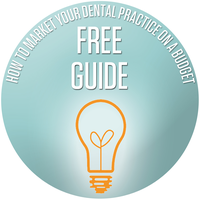There’s always room for improvement. Always.
Let’s say your waiting room has been recently renovated. Your staff is already highly-trained and your patients love them. Your office is decked out with the latest technological bells and whistles. You’ve done everything you can think of to make your practice the best it can be. So, what next? How do you continue to take it up a notch?
Educating dental patients is going the extra mile. 
All dentists inform their patients about brushing and flossing, but there’s much more that could be taught. If you take the initiative to teach your patients something new, you’ll stand out from the pack. Your patients will feel like you have a vested interest in them, which they’ll appreciate. And knowledge is power. It’s cliché but no less true. When a patient feels empowered with knowledge, they’ll become more involved in their own health. And who knows, you might be answering a question they’ve always wanted to ask.
Keep it relevant. Keep it current.
Not sure where to start? We’ve provided a few suggested dentisty topics below.
Everyday Living
If any industry headlines grab you, you can share them with your patients. Just be sure to put the information in non-technical language, focusing on how the topic will affect individual patients.
- Inform your patients about water fluoridation and why it’s important.
- The ADA and U.S. Surgeon General recently commemorated the 70th anniversary of community water fluoridation.
- Although an important topic in the industry, the public is less informed about the practice and how it’s a safe, beneficial, and cost-effective public health measure for preventing tooth decay.
- Studies show that community water fluoridation prevents at least 25% of tooth decay in children and adults.
- Teach them about the correlation between gum disease and smoking, diabetes, and certain medications (including steroids, anti-epilepsy drugs, cancer therapy drugs, calcium channel blockers, and oral contraceptives).
- Screen your patients for these and other factors that increase the risks of developing gum disease. Educate them about options.
- Screen your patients for these and other factors that increase the risks of developing gum disease. Educate them about options.
- Share the new Dietary Guidelines from the U.S. Department of Health and Human Services and the USDA.
- The latest food guidelines from the government ask Americans to limit their intake of added sugars to less than 10% of their daily total calories. Explain why there are dental ramifications of consuming too much sugar and make sure they understand the difference between natural sugars found in fruit and syrups/sweeteners.
Home Care
While most of the time you’ll want your patients to come into the office if an emergency arises, there are some minor issues that can be taken care of at home.
- Teach patients about some simple precautions they can take to avoid injuries. This could include:
- Wearing a mouth guard for sports
- Which foods can crack teeth
- Warnings about using teeth to cut things (and how scissors are always a better solution)
- Show them how to remove objects that get stuck in their teeth.
- Instruct them how to clean and ice their tongue or lip after they’ve bitten it by accident.
- Tell them what they can do on their own to ease a toothache.
Kid Care
Personal details you pick up about a patient’s life are also great starting points. Even if you don’t specialize in pediatrics, young kids are probably all around you. Any new mom would be happy to learn a few things about her child’s teeth.
- Discuss the basics on baby teeth.
- You can go over when these first teeth will come in and how to treat tender gums.
- Emphasize why it’s important to take care of baby teeth, even though they’re only temporary. New parents might not know how they help with speech development and jaw spacing.
- Teach parents how to brush baby teeth and clean gums.
- Ask if thumb sucking is a problem with a patient’s young child and show parents how they can help their kid stop.
A Sensitive Subject
- Screen your patients for sensitive teeth.
- Talk about what is causing the issue and the science behind it.
- From desensitizing toothpaste to surgical gum grafts, inform patients about all of their options for treatment.
The possibilities are endless, and whatever extra steps you take with your patients will be appreciated. Is there a certain topic you like to teach your patients about? Please feel free to share any other subject ideas in the comments below.



